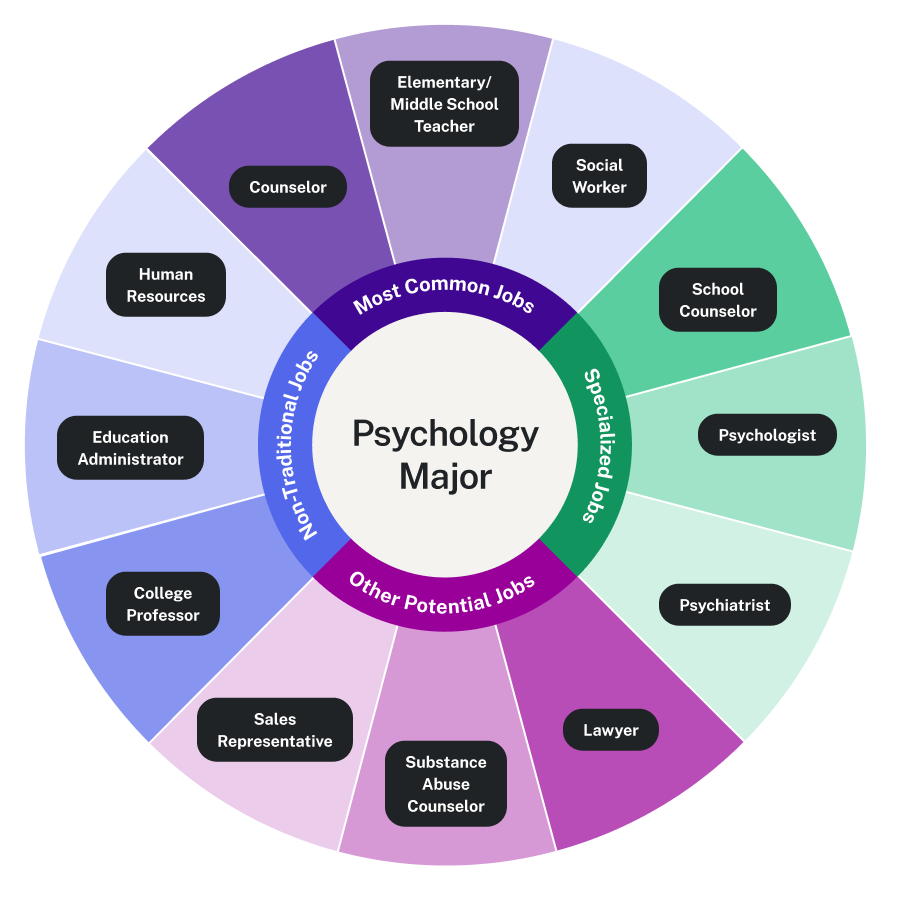
Careers in Psychology
Psychologists can work in many different places doing a variety of things. In general, anyone wishing to continue a career in psychology at a 4-year institution of higher education will have to earn a doctoral degree in psychology for some specialties and at least a master’s degree for others. Bachelor’s degrees in Psychology are still versatile and could be good stepping stones for other advanced degrees or for various careers, but to work within Psychology, most professions will require a master’s degree or doctorate degree after a bachelor’s.
Psychologists with PhDs
To become a licensed psychologist in most specialties, a doctoral degree is required. There are two main types:
Ph.D. (Doctor of Philosophy in Psychology)
- Emphasizes research and academia.
- Requires a dissertation (a major research project or collection of studies).
- Graduates often work as professors, researchers, or in academic clinical roles.
- Common specialties: biological psychology, clinical psychology, social psychology.
Psy.D. (Doctor of Psychology)
- Emphasizes clinical training and practice.
- Prepares graduates to work directly with clients in counseling or therapy settings.
- Focuses less on original research and more on applied skills.
Psychologists vs. Psychiatrists
It’s important to distinguish:
- Psychiatrists are medical doctors (M.D.s) who can prescribe medication and treat mental health disorders using medical approaches.
- Clinical psychologists (Ph.D. or Psy.D.) provide therapy, administer assessments, and conduct research but typically do not prescribe medications.
- In most states, licensure requires postdoctoral training or supervised internship hours
Psychologists with Master’s Degrees

A master’s degree opens many applied career paths, such as:
- Therapy and counseling: marriage and family therapy, child psychology, school psychology.
- Applied fields: sport psychology, industrial-organizational psychology, user experience (UX) research, instructional design.
- Education: teaching at community colleges or serving as adjunct faculty.
- Social services: licensed clinical social work, case management, program development.
- Organizational development: improving workplace dynamics and employee well-being.
Master’s programs often emphasize specialized training and allow graduates to enter the workforce more quickly than doctoral programs.
Bachelor’s Degrees in Psychology
A bachelor’s degree provides a strong foundation in research methods, critical thinking, and understanding human behavior. Graduates often pursue entry-level roles in:
- Human resources and personnel management.
- Social services (e.g., case management, community outreach).
- Research support (lab or field assistant).
- Market research and data analysis.
- Human factors and product design.
These transferable skills—research, communication, problem-solving, and people skills—make psychology graduates adaptable and employable across many industries.
The APA website offers information about a variety of psychology careers, including potential job roles, typical work settings, and projected job outlooks in each field.